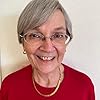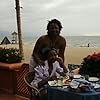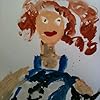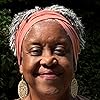To answer questions about
Fifty Words for Rain,
please sign up.
Diane Nagatomo
I am just 10% into the book and I'm considering abandoning it because of the huge mistakes that I have noted so far, which also makes me question the author's "qualifications" and her "research". My feelings are not about whether or not someone has the "right" to tackle this subject. As far as I'm concerned, fiction writers have the right to write about whatever they want.
But there are glaring errors that interfere with the the suspension of belief you need to fall in love with a novel. The first error is such a glaring one that I can't imagine how it got past the editorial team. I can't imagine that the author didn't know. The main character, Nori, with a Japanese mother and an African American GI father is supposedly born in 1940 and puts her at age 8 when the story starts. Well, the Occupation started after the war ended in 1945. There would have been absolutely no way an American GI would have been in Japan in the late 1930s unless we are talking about an alternate universe. Let's give Nori's mother a bit of time to meet the father, start a relationship, give birth, and then return the baby to her parents' estate--realistically Nori would be a toddler. When Chapter 1 opens, Nori is ten and has pretty much been held captive in her grandparents' attic for the past two years. Attic? Anyone familiar with Japan or Japanese housing would immediately know that attics do not exist. The three story house (while not impossible) is unlikely to have been the residence of this aristocratic family's country home in the 1940s. It would have been a sprawling house with numerous tatami rooms. The first scene where the grandmother beats Nori's buttocks with a wooden spoon is a second area that is hard for me to swallow. I have NEVER heard of anyone in Japan beating a child in such a cold, systematic way. (this is not to say it is impossible, but highly unlikely). In fact, Japanese rarely strike children--and when the grandmother slaps Nori in the second chapter, that also felt false. I doubt if the grandmother would have resorted to skin lightening techniques and such cruel disciplinary measures. As an aristocrat she would have simply farmed Nori out to another family and have them raise her instead. The so-called disgrace of the illegitimate granddaughter would have been out of sight, out of mind.
The half-brother Akira--he returns to his maternal grandparents after his father dies as the heir. Again, this is unlikely (although not impossible). As a member of an aristocratic family, he would belong to the paternal side side and it is highly likely they would keep him in their extended family. I haven't read enough into the story to know more details of that.
The references to Christianity (the Bible, prayers, etc) don't quite fit in with a family that has imperial ties. Instead, it would be Shinto and Buddhism. When I read that there was an altar in Nori's attic room, I was taken back. Because there would be just ONE altar in a home, and it would not be in the attic but in a place of prominence--because that's where the ancestors are worshiped. And Nori taught herself how to read English from a book her sensei had given her when presumably she has no knowledge of English from her years of isolation?
As a reader I want to trust an author when I read a novel. I want to believe that the author has done his/her homework as much as possible--particularly when it is historical fiction. What made "Memoirs of a Geisha" so outstanding was the author's attention to details were (for the most part) spot on.
After 40+ years living in Japan, I very rarely see a book that gets it 100% right. Usually I'm okay with that. But with the huge factual error surrounding the timing of the character's birth sets off alarm bells about the rest of the book--and just 10% in, the setting detail errors, which come one after another, are too distracting.
As a researcher of intercultural/interracial relationships in the Japanese context, I WANTED to love this book. I really wanted to know more about Nori's journey and experiences and the hardships she would have endured as a biracial child in the 1950s.
But I'm not sure if I'll end up finishing the book or not. I do like the writing though. I feel as if I'm reading a combination of "A Little Princess" and "The Secret Garden" which happens to be set in Japan.
But there are glaring errors that interfere with the the suspension of belief you need to fall in love with a novel. The first error is such a glaring one that I can't imagine how it got past the editorial team. I can't imagine that the author didn't know. The main character, Nori, with a Japanese mother and an African American GI father is supposedly born in 1940 and puts her at age 8 when the story starts. Well, the Occupation started after the war ended in 1945. There would have been absolutely no way an American GI would have been in Japan in the late 1930s unless we are talking about an alternate universe. Let's give Nori's mother a bit of time to meet the father, start a relationship, give birth, and then return the baby to her parents' estate--realistically Nori would be a toddler. When Chapter 1 opens, Nori is ten and has pretty much been held captive in her grandparents' attic for the past two years. Attic? Anyone familiar with Japan or Japanese housing would immediately know that attics do not exist. The three story house (while not impossible) is unlikely to have been the residence of this aristocratic family's country home in the 1940s. It would have been a sprawling house with numerous tatami rooms. The first scene where the grandmother beats Nori's buttocks with a wooden spoon is a second area that is hard for me to swallow. I have NEVER heard of anyone in Japan beating a child in such a cold, systematic way. (this is not to say it is impossible, but highly unlikely). In fact, Japanese rarely strike children--and when the grandmother slaps Nori in the second chapter, that also felt false. I doubt if the grandmother would have resorted to skin lightening techniques and such cruel disciplinary measures. As an aristocrat she would have simply farmed Nori out to another family and have them raise her instead. The so-called disgrace of the illegitimate granddaughter would have been out of sight, out of mind.
The half-brother Akira--he returns to his maternal grandparents after his father dies as the heir. Again, this is unlikely (although not impossible). As a member of an aristocratic family, he would belong to the paternal side side and it is highly likely they would keep him in their extended family. I haven't read enough into the story to know more details of that.
The references to Christianity (the Bible, prayers, etc) don't quite fit in with a family that has imperial ties. Instead, it would be Shinto and Buddhism. When I read that there was an altar in Nori's attic room, I was taken back. Because there would be just ONE altar in a home, and it would not be in the attic but in a place of prominence--because that's where the ancestors are worshiped. And Nori taught herself how to read English from a book her sensei had given her when presumably she has no knowledge of English from her years of isolation?
As a reader I want to trust an author when I read a novel. I want to believe that the author has done his/her homework as much as possible--particularly when it is historical fiction. What made "Memoirs of a Geisha" so outstanding was the author's attention to details were (for the most part) spot on.
After 40+ years living in Japan, I very rarely see a book that gets it 100% right. Usually I'm okay with that. But with the huge factual error surrounding the timing of the character's birth sets off alarm bells about the rest of the book--and just 10% in, the setting detail errors, which come one after another, are too distracting.
As a researcher of intercultural/interracial relationships in the Japanese context, I WANTED to love this book. I really wanted to know more about Nori's journey and experiences and the hardships she would have endured as a biracial child in the 1950s.
But I'm not sure if I'll end up finishing the book or not. I do like the writing though. I feel as if I'm reading a combination of "A Little Princess" and "The Secret Garden" which happens to be set in Japan.
Ann-marie
Qualifications? That's a loaded word. Many writers write on subjects they have no personal knowledge. They are storytellers. I am relieved to see a black woman tackle a subject like Lemmee has. Should she have stayed in her "lane" and chosen a more stereotypical subject--single mom, poverty? Heck no! I haven't seen any interviews with the author but I have no doubt she has good answers to your weak questions.
Yoshika
This feels like a loaded question.
For what it's worth, I'm Japanese American/haafu (I've lived in Japan too) and enjoyed reading this book. I did not take offense to the descriptions of Japan. I wanted to share my perspective on this thread for others who may be lurking.
For what it's worth, I'm Japanese American/haafu (I've lived in Japan too) and enjoyed reading this book. I did not take offense to the descriptions of Japan. I wanted to share my perspective on this thread for others who may be lurking.
Laura
If you read about her background she also spends time in Kyoto Japan, so she probably has some connection to it. I'm not sure why any author has to have "qualifications" to write a book, other than being a writer.
Amy Warrick
Maybe this is the wrong place...I don't have an answer to the question but I ended up here with the same question. It's not that I don't feel authors can't write other povs, and it's not a "how dare you" directed at the author... it's that the setting feels so off to me and it's distracting. I'm only Fifty or so pages in and I've just read that the grandmother was wearing a somber black yukata... and I'm like "really are there somber yukatas?" There are SO few Christians in Japan yet they allow Noriko a crucifix in her room.
So yes, I was wondering the same thing. I don't give a rat's ass who the author is, I want to know if the cultural details are correct, in which case I will sit back down and shut up. For info I was an assistant english teacher in Japan. No expert, it's just that Japan is so hard to get right. I don't feel Sara should have been so criticized.
So yes, I was wondering the same thing. I don't give a rat's ass who the author is, I want to know if the cultural details are correct, in which case I will sit back down and shut up. For info I was an assistant english teacher in Japan. No expert, it's just that Japan is so hard to get right. I don't feel Sara should have been so criticized.
Sara
Responding to Pearl Hart: Hi Pearl. I'm happy to answer your question about why I am so concerned about the qualifications of a POC author, though I hadn't really thought of it that way. Whether or not she is a POC is irrelevant to the fact that she's made mistakes in her depictions of Japan, which others have noted as well. As to why I am concerned, it comes from a true love of Japan. As an undergraduate I majored in Japanese Language and Literature and did a junior year abroad in Kyoto. As soon as I graduated from college, I returned to Japan because I realized it was impossible to get to know the country with less than a year of experience living there. I lived there for 13 years (also not long enough) and learned the language enough to become a translator. I also married into a Japanese family and have two half Japanese children. So, you can see that my interests are not trivial. I'm not sure what it is you mean when you say "Japanese readers can do that for themselves." Is there a translated version of this book into Japanese? I think many older Japanese would be horrified by this portrayal of their country and younger Japanese might find humor in it. Pearl, I'm not saying the author got it 100% wrong and I can see that many enjoyed the book as a romance and tragedy porn. Did it portray the "otherness" of a hafu Japanese child in Japan? Perhaps it did in spirit, though not much in detail. The author is young and imaginative. I hope she is humble enough to take the criticism offered by myself and others and do better next time. Also, I'm very curious to hear of these "Japanese sensitivity readers" you speak of. Were you perhaps one of them? Finally, my opinion is just one opinion. I will always speak up about inaccuracies in books. It's a librarian thing, I guess. But I would hope that there would be a diversity of opinions here and readers can choose for themselves which they believe are valid. I am sorry that I used the word "qualifications" because we're all qualified to write fiction. It is just so very sad, though, when one finds mistakes in a book that could have been quite good.
Sunyi Dean
the author is biracial, lived in a japan for awhile, and has japanese family.
I have to say, I'm very leery of angry white women coming after biracial bipoc authors (as so often seems to happen, time and again) who write from legitimate diaspora experience, and holding them up to a standard of exacting perfection which they do not apply to the many white men writing completely outside their experiences.
I have to say, I'm very leery of angry white women coming after biracial bipoc authors (as so often seems to happen, time and again) who write from legitimate diaspora experience, and holding them up to a standard of exacting perfection which they do not apply to the many white men writing completely outside their experiences.
Rebecca
I had the same wondering when I started reading this book. I also had the same question when I read " Memoirs of a Geisha" by Arthur Golden (who, has an M.A. in Japanese history, conducted several interviews with geishas, and lived in Tokyo for a while.) Asha Lemmie's bio on Goodreads states that she has spent time in both London and Kyoto (two major cities in the book). I think it matters when an author has done their homework for their stories that is portraying a culture different than one(s) they were raised with. When I read a story from an author about their own culture I don't wonder as much if the details are correct, I usually trust them to write from a position of authority on their own culture. When an author writes about another culture I don't automatically assume they are speaking from a position of authority. Considering the backlash and controversy around "American Dirt" by Jeanine Cummins, (mentioned in the comments here) I think that Sara's question is appropriate here. How do we know when an author is relying on incorrect and harmful stereotypes, or when their writing reflects something real? The author's experience and research matters.
Mickey
Sara: totally understand your question after all the uproar about American Dirt and whether the author was guilty of cultural appropriation. We should not accuse someone of having issues and or biases just for asking a question.
Lola
I'm going to set aside the idea of "qualifications" and respond to the question of "why the author chose to set this book in Japan." I think the author simply grew up fascinated by Japan like so many people her age, swept up in Japan's surge in popularity in the past 20 or so years. She set the story in Japan because she likes Japan.
Does the author like Japan as a setting because it's very different from where she grew up-- because it's "exotic"? I wondered about this because she described such an outlandish, over-the-top setting, alien to most people anywhere. Yet what she described was definitely not Japan. Did the author just want an otherworldly location for a human story?
I say that her description was not Japan because I've lived in Japan for almost 20 years. I've lived less than an hour outside Kyoto for over 15 years, and been to Kyoto scores of times, including inside old houses.
Does the author like Japan as a setting because it's very different from where she grew up-- because it's "exotic"? I wondered about this because she described such an outlandish, over-the-top setting, alien to most people anywhere. Yet what she described was definitely not Japan. Did the author just want an otherworldly location for a human story?
I say that her description was not Japan because I've lived in Japan for almost 20 years. I've lived less than an hour outside Kyoto for over 15 years, and been to Kyoto scores of times, including inside old houses.
GardenGirl
"Qualifications" may not have been the best word selection, though I do entirely recognize what the author of the question was presenting. Japan's cities are specific in culture and history. The reach of powerful families is not unlike those in other cultures. I appreciate the author's bold storyline and definitely think the tale is one for the telling, but it did fall flat at times, with incongruities that I did not feel remained true to Nori's character. I don't think the question was one of race.... it was, rather, one of research and experience.
Jordan Lombard
It may also be helpful to know she wrote most of this as a teenager: https://debutiful.net/2020/09/22/asha... And here's another interview: https://2020debuts.com/meet-the-autho....
Pearl Hart
I think a better question might be why a white woman is so concerned with the qualifications of a POC author. If your concern is around cultural or racial sensitivity, you really have no business interrogating and arbitrating whether or not the author's qualifications are suitable. Japanese readers can do that for themselves. I assume this novel has been through rounds of sensitivity reads. Are you suggesting you know better than Japanese sensitivity readers? As it is, you're acting like a white savior and speaking for people you have no business speaking for. Furthermore, based on your responses elsewhere (now edited to be less vitriolic), you seem to be suggesting that your specific notion of an authentic Japan is the "correct" narrative. Again, if she is so wrong in her portrayals, let Japanese people speak for themselves. However, if your gripe is that she isn't portraying Japan the way you, a white woman, think it ought to be portrayed, then you really should interrogate your own culturally essentialist view of Japan. Unfortunately, being fluent in the language and literature does not preclude you from biases. As I'm sure you are aware, some of the most orientalist scholars of the 20th century were perfectly fluent in both language and cultural productions.
*EDIT*
I'd like to respond to Sara here where it's visible for anyone coming into this thread.
The problem isn’t whether Sara has experience or knowledge about Japan. The problem is the position of authority she is claiming in relationship to the story’s point of view. Even with her experience, she is not in the position to be heading this crusade about a racialized point of view. The problem with Orientalism isn’t a lack of expertise; it’s the underlying assumptions or points of view that color that expertise and create expectations about how things should be portrayed. Lafcadio Hearn lived in Japan, wrote extensively about Japan, became a Japanese citizen, changed his name, married into a samurai family, and had four half-Japanese children. He was still an Orientalist. Donald Keene is one of the most recognizable and prolific names in Japan studies. His earlier works are largely considered to be Orientalist.
I’m going to save Sara's comments so that when I teach my graduate students about how the Dunning Kreuger effect can manifest in Area Studies undergrads, I have a perfect example.
*EDIT*
I'd like to respond to Sara here where it's visible for anyone coming into this thread.
The problem isn’t whether Sara has experience or knowledge about Japan. The problem is the position of authority she is claiming in relationship to the story’s point of view. Even with her experience, she is not in the position to be heading this crusade about a racialized point of view. The problem with Orientalism isn’t a lack of expertise; it’s the underlying assumptions or points of view that color that expertise and create expectations about how things should be portrayed. Lafcadio Hearn lived in Japan, wrote extensively about Japan, became a Japanese citizen, changed his name, married into a samurai family, and had four half-Japanese children. He was still an Orientalist. Donald Keene is one of the most recognizable and prolific names in Japan studies. His earlier works are largely considered to be Orientalist.
I’m going to save Sara's comments so that when I teach my graduate students about how the Dunning Kreuger effect can manifest in Area Studies undergrads, I have a perfect example.
Leanne
Wow. I'm not sure what your issues are, Sara, but maybe you need to check your biases. Whatever you think you know may be a little bent were you to examine it.
Amy
I've lived in Japan for many years and I felt that it was great!
I would love love love to see more authors of color, especially black (or African-American) write about Japan. Japan has been the domain of white authors for so long, and especially white authors who don't know anything (or don't know much.) Japan is not a place that only white people can write about.
There are Christians in Japan---not a large number statistically, but they def. exist. I've heard that among the upper classes, Christianity has been in vogue (over the years.) Japan doesn't make the distinctions that America or other countries do, you can be Christian, but still have a shrine to your ancestors, etc.
I know the Catholic schools here in Japan are for wealthy people. Not all of them Christian, but some fo them, and what's interesting is that the Catholic schools remind me of Finishing Schools. For many Japanese people, Christianity is the west, something to be aspired to.
Let's just enjoy this book. I found it wonderfully written.
I would love love love to see more authors of color, especially black (or African-American) write about Japan. Japan has been the domain of white authors for so long, and especially white authors who don't know anything (or don't know much.) Japan is not a place that only white people can write about.
There are Christians in Japan---not a large number statistically, but they def. exist. I've heard that among the upper classes, Christianity has been in vogue (over the years.) Japan doesn't make the distinctions that America or other countries do, you can be Christian, but still have a shrine to your ancestors, etc.
I know the Catholic schools here in Japan are for wealthy people. Not all of them Christian, but some fo them, and what's interesting is that the Catholic schools remind me of Finishing Schools. For many Japanese people, Christianity is the west, something to be aspired to.
Let's just enjoy this book. I found it wonderfully written.
Mary
The only reason I can think of as to why this book was set in Japan was to make the ending more believable: allegiance to family. But I still found it unrealistic. I enjoyed the book, despite the strange "facts" about Japan that popped up here and there, that made me think, "Really?"
Valerie Hartman
The author's grandmother was Japanese.
the racism written about in the book is not surprising to people of color.
the racism written about in the book is not surprising to people of color.
Tracy
What do you mean qualified? You think she needs a degree or a certain number of stamps in her passport to write? She may have made some mistakes, but she was only 15 when she started writing it, and it was amazing! Millions loved it! That's the only qualification she needs! I can't wait to read her next one!
What do you mean qualified? You think she needs a degree or a certain number of stamps in her passport to write? She may have made some mistakes, but she was only 15 when she started writing it, and it was amazing! Millions loved it! That's the only qualification she needs! I can't wait to read her next one!
Andre
Her godmother is Japanese. Lemmie learned to speak Japanese fluently by visiting her godmother in Japan. Haven’t you ever heard about children fathered by black soldiers abroad?
About Goodreads Q&A
Ask and answer questions about books!
You can pose questions to the Goodreads community with Reader Q&A, or ask your favorite author a question with Ask the Author.
See Featured Authors Answering Questions
Learn more

















